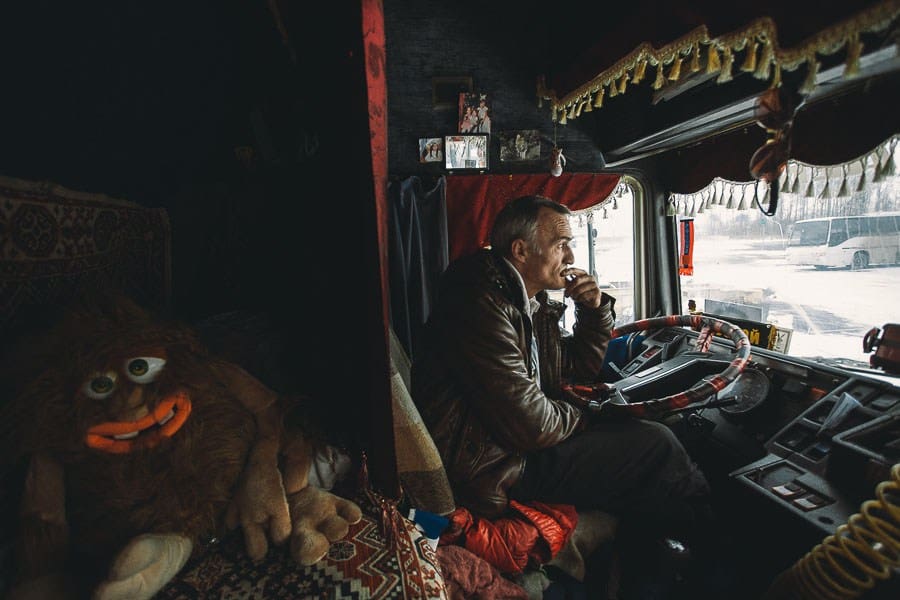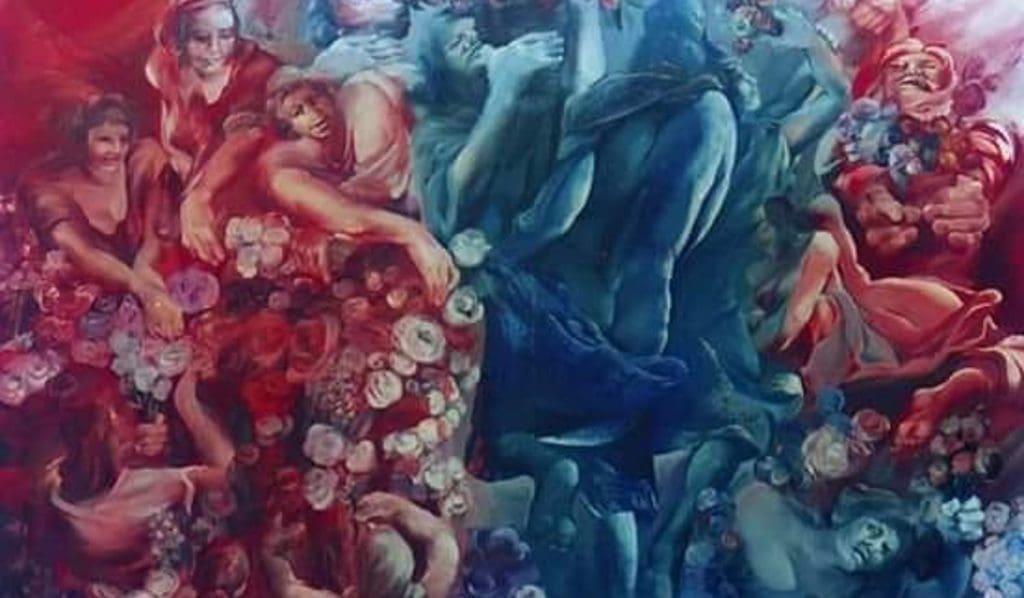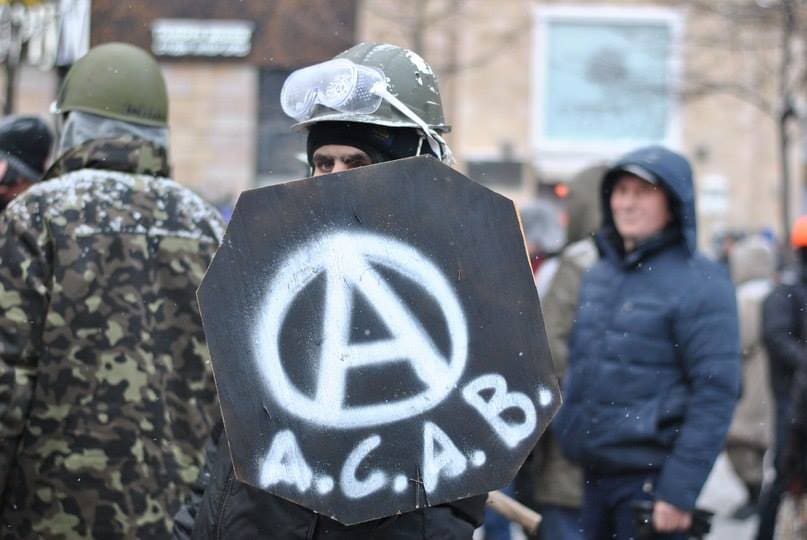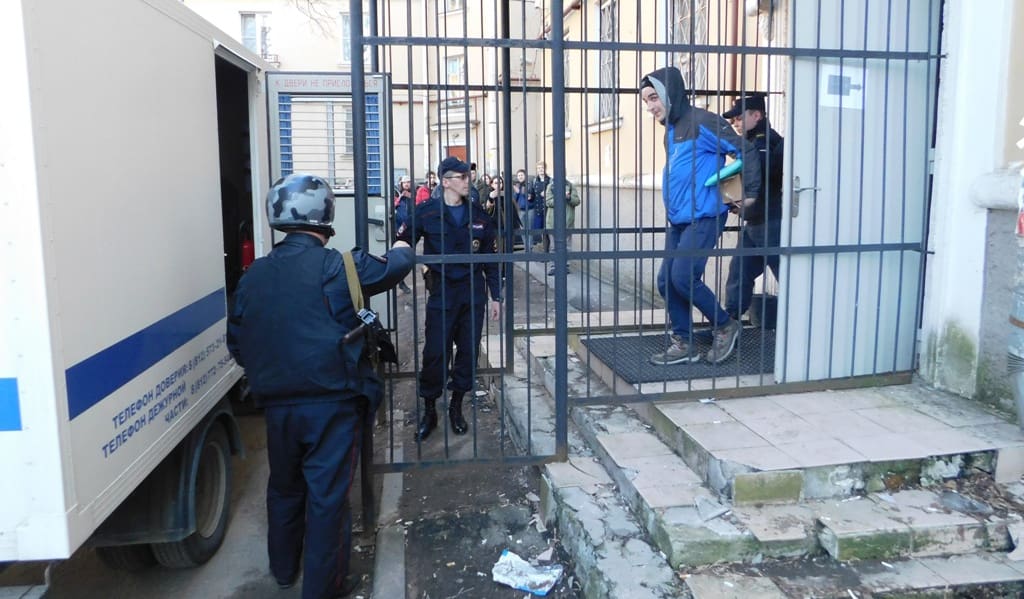Note from the Russian Reader: The nationwide strike by Russian truckers officially wrapped up on March 1, but Petersburg drivers have continued to maintain their makeshift protest camp outside the MEGA Dybenko shopping center [in the city’s far southeast]. They have declared their campaign against the new Plato mileage tolls system “indefinite.”
Nearly all of the drivers who have driven their trucks to MEGA Dybenko are individual entrepreneurs. After the innovations wrought by the Rotenbergs [please visit the Russian Reader for more on this history, of which Antidote has reprinted only a fraction. —ed.], business has become unprofitable for the truckers. Why have those who work for themselves decided to go on protesting instead of hauling freight? Olga Rodionova put together the following portfolio of photographs of truckers and their statements for paperpaper.ru.
“I’m Very Tired of the Sense of Insecurity”: How the Truckers’ Protest Has Gone Indefinite
Olga Rodionova for paperpaper.ru
3 March 2016

“Have you seen the roads in this country? I have been paying taxes for many years, the roads have not got better, but now I have to pay even more? One wheel costs me 20,000 rubles [approx. 250 euros]. Have you seen how many wheels I have on my truck? If I pop a tire in a pothole, who can I blame? Nobody! No one has ever got any compensation from the highway services or the government for breakdowns caused by the poor state of the roads. We just pay and pay. I have sometimes left at five in the morning to avoid traffic jams. Once I picked up the load, got it unloaded, and then returned the container, it was already eleven in the evening. Sometimes there is no point going back, and I’m away from home for three days at a time. Many of our guys say there is no point in striking, that nothing will change, but I’m very tired of the sense of insecurity in all parts of life. It’s important to me to be here.”

“Where are the ruts deepest on multi-lane highways? In the left lanes! But we are obliged to drive in the right lanes. The roads in Russia are bad, because funds for road construction are embezzled and roads are not built to technical specs. But they put the blame on us, saying the trucks are to blame for everything. [Answers his telephone.] Hello. Yeah, we are doing a bit of striking. You come with Dima. He can climb around on the rigs.”

“Plato has only one office in Petersburg where I can get a mileage recorder installed, but they don’t have them in stock! Meaning I couldn’t use Plato even if I wanted to. The mileage recorders were doled out to the major companies, while we, the midsize companies and individual entrepreneurs, are being squeezed out. To be able to get onto the road and work without paying a fine, I have to travel hell knows where to a computer terminal on Fermskoye Highway [in the far northwest of the city] and waste time and money. But there is no guarantee the terminal won’t freeze or just won’t be working. There is no point in talking with the people who work there: they are clerks who don’t decide anything. It’s like trying to agree with a highway patrol inspector about changing the traffic rules.”

“Cargo haulage rates have not changed for seven or eight years. During that time, only the price of fuel and taxes have gone up. If you work it out, I pay threefold. First, I pay all my taxes. Then, due to them, I end up with less and less money. Finally, I pay again as a consumer at the stores: everything has become more expensive. The Plato system is not the whole matter here. They are just muscling out small business. Before, when there was no Plato, we never gave a it a second’s thought. We drove and drove. There was work, and thank God. I am fifty years old. Who is going to hire me? It is a long way to retirement, and I do not want to sit on my butt working as a watchman.”

“Before the crisis of 2007, I had three trucks. I had to sell all of them to pay the mortgage: I was afraid of winding up homeless. I myself am from Ufa. I came here with a load and stayed to support the protest. The wife chews me out, of course, saying I should come home already. But if everyone thinks it doesn’t concern them, then nothing is going to change.”

“I don’t expect anything good to happen. I would be thankful if they wouldn’t prevent me from working. The less the government worries about me, the better it is for me. It’s scary, of course. I’m 49. Where am I going to find a job?”

“I have an illegal fine against me in the database. I proved in court the fine was illegal, but it is still listed there. The highway patrol tried to keep me from getting here to the camp. I only broke through thanks to a truck driver who helped out. I got him up on the radio, and he covered me from the highway patrol. I have been behind the wheel my whole life. I was even born in a car, in my dad’s Pobeda. I pay taxes and duties. I don’t work under the table. I just want to work in peace.”

“I was involved in the first protest, too. I met some of the guys there, and some of them here. What do I want? The other guys have said it already. If things don’t work out, I will close my individual enterprise and register for unemployment. They have put so many obstacles in our way we cannot get out on the highway at all. There are no mileage recorders in stock, the Plato computer terminal doesn’t work, and if a trip isn’t registered on Plato, the fine is higher than the money you would make on the load. It is just a legal means of driving us from the market, you see? It’s not even a matter of extortion. We simply cannot work.”

“You know, my lawyer told me not to wag my tongue here especially.”

“Plato is not the end; it is only the beginning. People say we should raise rates or let the customers pay the tolls. But fuel has again gone up, and spare parts for trucks have gotten a lot more expensive. As a consumer, I suffer from this, too. The wife chews me out, of course. We have no money, the tank is empty. But as a man, I would feel ashamed towards the other guys, so that is why I am parked here. Or rather, that is why I live here. The wife says I should just live here then.”
Translated by the Russian Reader.





